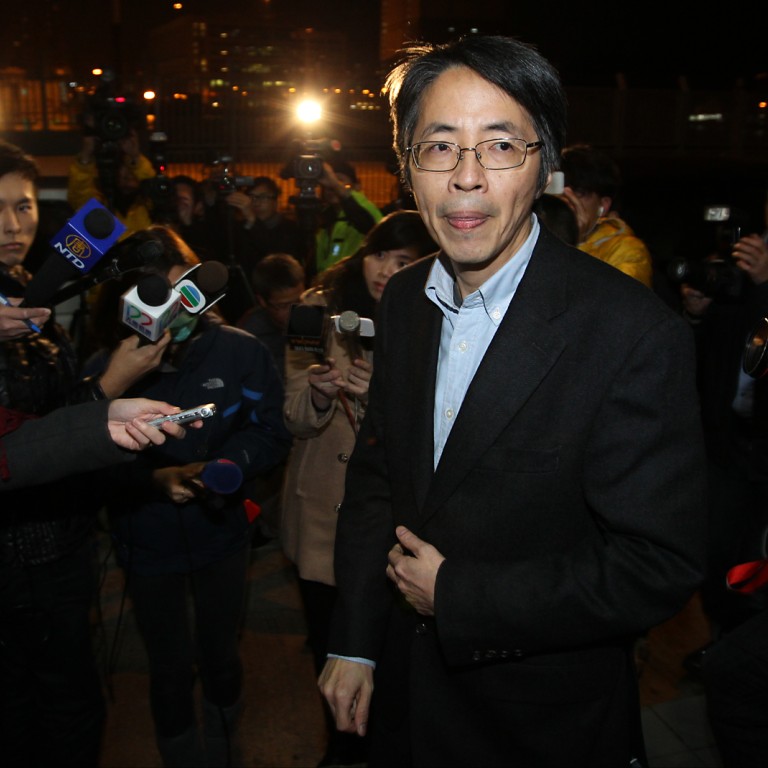
Ming Pao brouhaha underlines threat to Hong Kong's media freedoms
Albert Cheng says the change of chief editor aroused only limited protest, while senior editors apparently sided with the management's decision
The controversy over the replacement of the chief editor amid allegations of interference in editorial freedom appears to have died down.
After a second meeting between senior management and staff representatives at the paper, the decision was seemingly accepted, allowing chief editor Kevin Lau Chun-to to be replaced by Malaysian journalist Chong Tien Siong.
Lau will be transferred to manage the group's internet business.
Some staff showed their discontent at the decision; 110 stood outside the newspaper's headquarters in silent protest, but the rest of the employees and supporters, including former staff, were nowhere to be seen.
The most ridiculous aspect of the whole affair was that, even though staff and supporters spoke up against Lau's removal, Lau himself seemed to have happily accepted his new post.
During the transition, former chief editor Cheung Kin-bor will step into the post. Cheung stressed that during his years as editor, the paper's owner Tiong Hiew King had never once interfered with the running of the newsroom. Cheung added that any personnel changes would not affect the paper's editorial direction, meaning it will maintain its impartiality.
There may be no obvious reason to fear for the future because Lau's replacement is seen as an outsider coming from Malaysia. But, before Lau was removed, the newspaper's boss Tiong had already posted a close ally, Lui Ka-ming, to "monitor" the paper's operations. Lui was chief executive of the paper's overseas operation in North America, and recently returned to Hong Kong in an administrative post. While he was editor there, there were claims that editorial independence was stifled.
So, the question is: what if Lui was appointed chief editor? Would staff and supporters accept him just because he is a local? If so, wouldn't that be double standards?
It is understandable why the saga has aroused limited public attention.
I recall what co-founder Louis Cha told reporters in 1999 regarding his business philosophy: "In the newsroom, only the democratic system and freedom of expression accepted by the boss can be allowed." He said if reporters and editors did not comply with orders, the boss could dismiss them right away.
Like other newspapers, has its own political stance, which means its staff and writers do not really have a free rein when it comes to editorial independence or freedom of expression. It all comes down to whether employees are willing to comply with the paper's stance and editorial direction.
To many long-time supporters, Ming Pao has changed to become a mouthpiece of the rich and powerful. Hence, even with a new chief editor, its fundamental qualities will remain the same.
If the matter was really about editorial independence, the ousted chief editor Lau and his transitional stand-in Cheung would have led the entire newsroom in a strike. That didn't happen. And if readers really care about the paper, they would have boycotted it to show their discontent. That didn't happen, either.
The final outcome shows senior management are on the same side as the boss and tacitly approved the change. They should be ashamed for pretending to safeguard freedom of expression.
The harsh reality is that since the handover, many local newspapers have been bought up by businessmen and have become tools for the establishment to maintain control and political stability.
The broadcast media, such as radio and television stations, which take up public airwaves and need government approval to operate, must serve the public to fulfil their responsibilities to society. This is especially so for RTHK as a public broadcaster, which relies on government funding.
The news media is the fourth estate, which is tasked to act as the custodian of public interest and be a government watchdog to monitor the administration and keep it in line.
The importance of editorial independence and freedom of expression can be wonderfully summed up by a famous quote by Thomas Jefferson: "If I had to choose between government without newspapers, and newspapers without government, I wouldn't hesitate to choose the latter."
And the sacred task of safeguarding a free press is in the hands of every one of us. Unfortunately, in Hong Kong, only a handful of media professionals seem to care about freedom of expression. So the least Hongkongers can do is to put pressure on the broadcast media to fulfil its duty to serve the public and protect the integrity of the fourth estate.
Our news media must keep an eye on each other to uphold the integrity of the press and not let another one succumb to political pressure.

